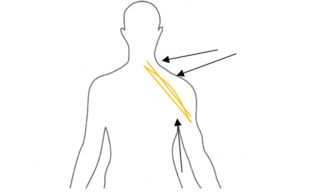Nerve blocks for hand surgery
What is a nerve block?
The brachial plexus is a network of nerves that supplies the shoulder, arm and hand with feeling and movement.
A nerve block is a technique used to numb the whole arm before surgery. It involves the anaesthetist injecting local anaesthetic around these nerves in the neck or shoulder resulting in a temporary loss of feeling and movement in the arm from shoulder to fingertip.
How is the injection done?
There are different sites that can be used to block the nerves to the arm depending upon the operation you are having, but this could be either around the collarbone or just above the armpit.

First, the anaesthetist will inject local anaesthetic into the skin which can sting a little. The needle is then passed through the numb skin to inject the anaesthetic around the nerves, using ultrasound to guide the needle. You may feel some pushing and pressure or even notice some involuntary movement of your muscles during the procedure.
This will not last long and is not something to worry about. The numbing effect takes between 20 and 40 minutes to work and generally lasts between 8 and 24 hours.
How are nerve blocks used?
- On its own (to allow for awake surgery)
- Together with sedation (you feel comfortable, relaxed & a little sleepy, but not unconscious)
- Together with a general anaesthetic
- Sometimes, if you remain a hospital inpatient, a plastic tube may be left in place to allow the local anaesthetic to be given continuously over a few days.
What are the advantages?
- It provides excellent pain relief during and after the procedure
- It can mean that you avoid a general anaesthetic for certain forearm and hand operations
- If you choose to be awake you can bring your own music to listen to during the surgery
- Less nausea, drowsiness and lethargy following your operation
- You are often able to leave hospital quicker, particularly if you have avoided a general anaesthetic
What are the possible side effects/ risks?
Nerve blocks are commonly performed at Chelsea & Westminster Hospital by specialist anaesthetists and the risk of complication is rare.
Failure of the anaesthetic
Occasionally the block fails to provide complete numbness. On the rare occasions this happens, we are able to supplement it with either more local anaesthetic or a general anaesthetic if required.
Bruising (fairly common)
All injections through the skin can cause bruising.
Pneumothorax (very rare):
For nerve blocks performed around the collarbone there is a small risk of the needle penetrating the lining of the lung which may cause a collection of air to accumulate, collapsing the lung. The use of ultrasound greatly reduces the risk of this. This complication can be treated promptly by the anaesthetist if it occurs.
Nerve damage (very rare):
Occasionally, patients may experience an area of persisting skin numbness which can last up to six weeks. The risk of permanent nerve damage is incredibly rare.
Nerve damage can also occur from the surgery itself, the position you are lying in during the operation or the use of an inflated tourniquet around the upper arm.
Adverse reactions to medication (very rare):
This can happen with any drug you are administered during surgery, including local anaesthetics. You will be constantly monitored by an anaesthetist throughout your surgery, whichever method of anaesthesia you receive.
Take care of your arm after surgery
- You will be given a sling to wear until normal sensation & movement have returned in your arm
- Take care to avoid accidentally damaging your arm while you cannot feel it
- Don’t let the arm come into contact with very hot or very cold items (such as radiators/kettles) as you may not be aware of this causing damage
What happens after the block wears off?
- You will start to feel pins and needles in the arm which will gradually disappear
- You should take painkillers BEFORE the block wears off to reduce the risk of you suddenly having pain
- You will be given information regarding when to start taking your painkillers
When to come back to hospital
- If the sensation/movement in the arm hasn’t returned after 1–2 days you should contact the Hand Management Unit
Contact information
Chelsea and Westminster Hospital
Hand Management Unit
1st Floor, Lift Bank D
T: 07875 284396 (Hand Trauma Coordinator)

